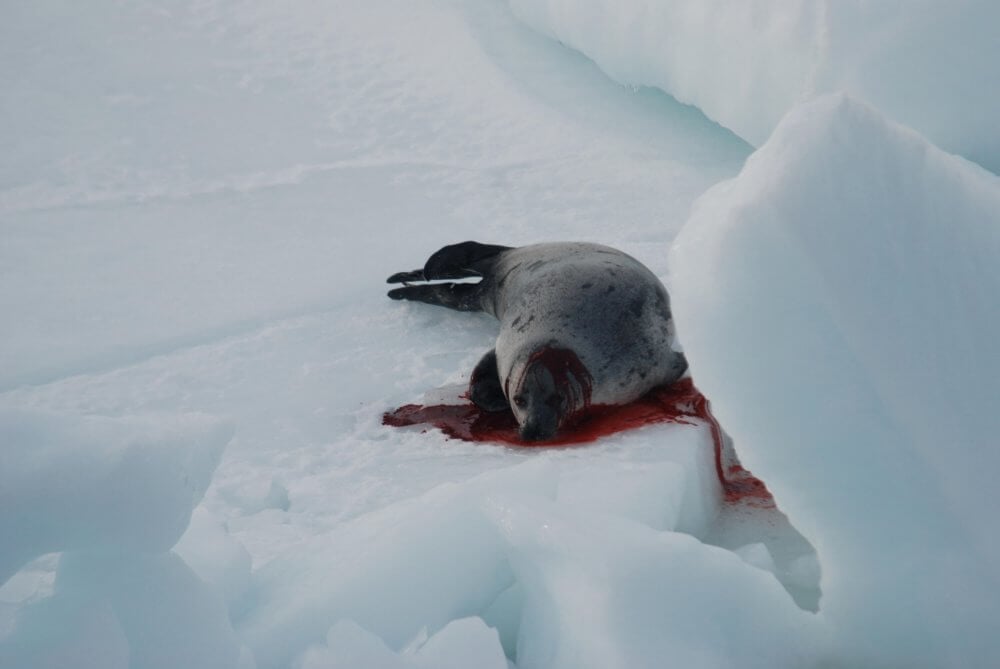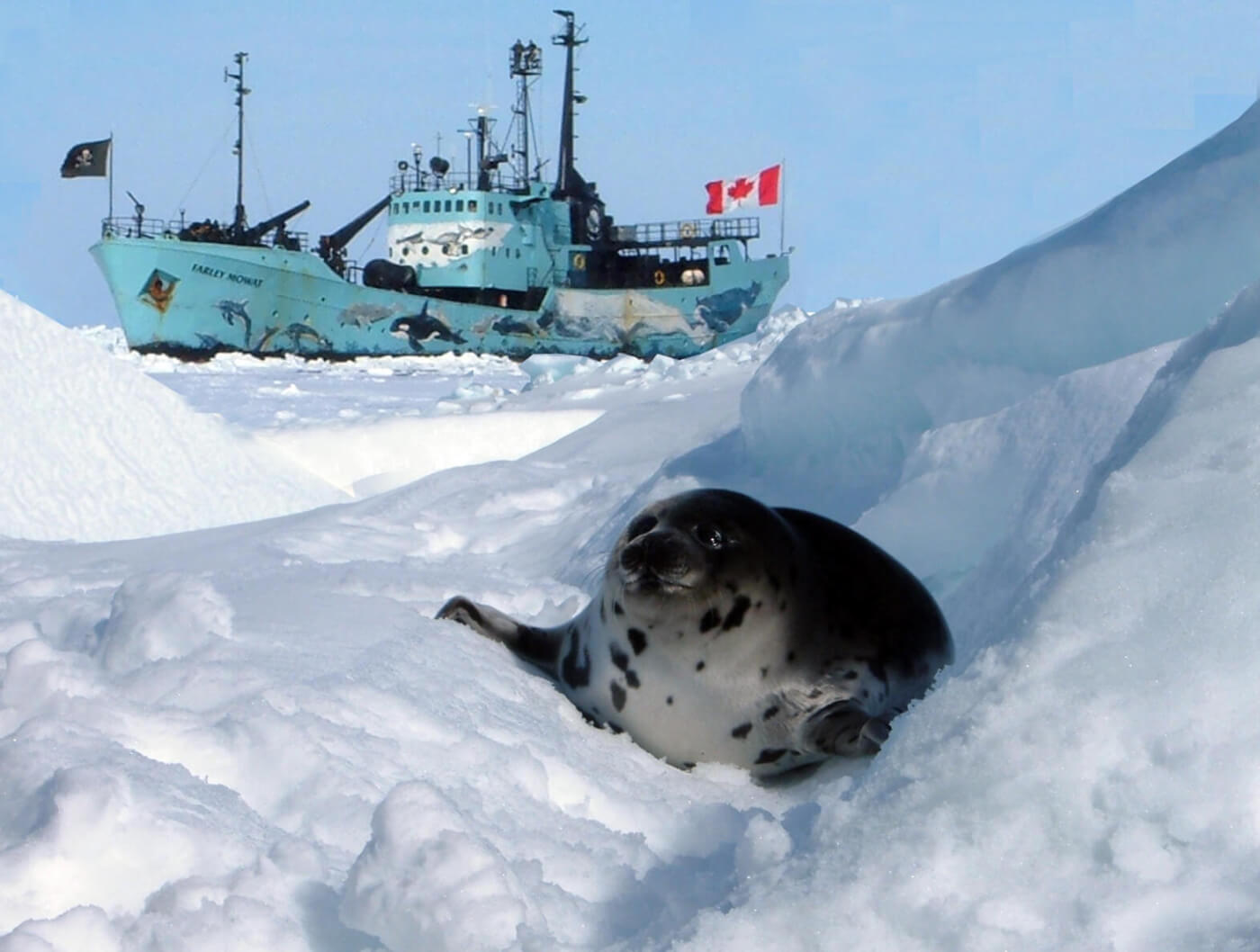Debate Kit: Should the Commercial Seal Slaughter Be Stopped?
A hot topic in classrooms and on the minds of many people today is the Canadian commercial seal slaughter. Here at PETA, our core belief is that animals are not ours to use. We know that many schools assign debates on topical issues to help their students learn to speak and write persuasively, develop research skills, and recognize multiple sides of a controversial or multifaceted issue. This student debate kit lists a variety of resources that can be shared with students to support the argument that the commercial seal slaughter should end and that the Canadian government should help sealers transition into other industries.
Resolved: The Canadian government should end its funding of the commercial seal slaughter immediately and help sealers transition into other industries.

Affirmative Argument
Every year, commercial sealers slaughter tens of thousands of baby harp seals on the Canadian ice floes. Some are shot with rifles, while others are bludgeoned with weapons called hakapiks—heavy wooden clubs topped by a barbed metal hammer head. It can take more than one blow to the head to kill a seal, and many aren’t immediately killed by the first gun shot, so they’re sometimes left to die slowly and painfully on the ice. Baby seals have no way to escape from the sealers’ weapons. Their skin is torn off, and their bodies are thrown onto piles to rot on the ice. It’s legal for seals to be killed as soon as they lose their white fur at just a few weeks of age, and most are between only 3 weeks and 3 months old when they’re slaughtered.
The Canadian government allows this cruelty to continue even though all major markets—including those in the EU, Russia (which had been importing about 95% of the pelts), and the U.S.—have banned seal-fur imports. Efforts to sell seal fur in China, which was once presumed to be an untapped market for seal-derived “products,” have also failed. The sealing industry has been condemned around the world, and most Canadians oppose it, too.

In recent years, fewer than 1,000 sealers have participated in the slaughter because of a lack of markets for seal products. The slaughter costs millions of dollars more to support than it earns, and even seal-fur processors have reportedly admitted that pelts are stockpiling because they can’t sell them. The commercial seal slaughter continues only because politicians funnel money toward it in order to win the favor of regional voters within sealing communities. They’re desperate to show voters in those regions that they support local business endeavors—apparently even if it means pouring money into an industry with no future, costing Canadian taxpayers millions every year.
There’s no excuse for this cruelty. The Canadian government frequently hides behind native people in a dishonest attempt to justify the commercial slaughter despite the fact that it accounts for the overwhelming majority of seals killed in Canada and is separate from Inuit subsistence hunts. The seal slaughter is cruel, unprofitable, and unsustainable and should end immediately.
Become an ‘Expert’
Use the following links to research general information about the commercial seal slaughter and prepare logical arguments against it:
- 8 Things You Need to Know About Canada’s Seal Slaughter
- About the Canadian Seal Hunt
- The Canadian Seal Hunt
- Frequently Asked Questions (Harp Seals)
- Myths and Facts About Canada’s Seal Slaughter
- Seal Slaughter, Stockpiles, and Subsidies: Canada’s Dirty Secret
Build Your Case
Use the following links to gather evidence and examples to support your position against the seal slaughter:
Research Articles and Investigative Analysis
- An Introduction to the Canadian Seal Hunt
- It’s Time to End Canada’s Bloody Seal Slaughter
- The End of the Commercial Canadian Seal Hunt Is in Sight
- The Hunt Canada Loves: Why Seal Clubbing Will Never Die
- Seal Slaughter Factsheet
- Striking, Checking, and Bleeding: Canada’s ‘Humane’ Seal-Slaughter Process
- Thousands of Baby Seals Clubbed to Death in Savage and Barbaric Slaughter
- Why Does the Annual Harp Seal Slaughter Continue?
- Why Is Canada Killing Seals?

Statements and Studies by Experts Against the Seal Slaughter
- An Ethical Critique of the Canadian Seal Hunt and an Examination of the Case for Import Controls on Seal Products
- Animal Welfare Aspects of the Killing and Skinning of Seals
- Hunters Are About to Kill Thousands of Baby Seals
- Questions About the Seal ‘Hunt’ Answered by Experts
- Welfare Aspects of the Canadian Seal Hunt: Final Report
The Declining Economic Viability of Seal ‘Products’
- Activists Urge Justin Trudeau to Phase Out Canada’s Failing Seal Industry
- Canadian Seal Hunt Is Not Economically Viable
- Carino Not Buying Seals This Year
- Seal Hunt Has Repercussions for Canadians and the Economy
- Sign of the Times: Top Buyer of Sealskins Wouldn’t Buy Pelts in 2015
- The Truth Behind Canada’s Seal Hunt
International Opposition to the Seal Slaughter
- Government Gives Green Light for Almost Half a Million Seals to Be Killed
- India Bans Seal Fur, Further Crushing Seal Slaughter
- Obama ‘Outraged’ Over Seal Slaughter
- Russia Bans Canadian Seal Fur
- ‘Save the Seals’ Celebrity Ad Series
- Seal Product Ban Upheld on ‘Ethical’ Grounds
- This Commercial Seal Slaughter Video Has Gone Viral—and Kind Stars Are Sharing It
- Victory for Seals! World Trade Organization Upholds EU Ban on Seal Fur

Finding the Solution
Use the following resources to help build a proposal suggesting solutions to issues that could allegedly arise from ending the Canadian seal slaughter:
- Canada’s Seal Slaughter Must Go the Same Way as Its Whaling Industry
- Canadian Seal Slaughter—Myths and Realities
- The Effects of Climate Change on Harp Seals
- Questions About the Seal ‘Hunt’ Answered by Experts
- Seals May Not Be Killing Cod, But Canada Is Still Killing Seals
- Urge Canada to End Its Shameful Seal Slaughter

Anticipate Counterarguments and Prepare Rebuttals
Analyze sources that support the seal slaughter to determine their stated reasons for doing so. Investigate how much money or favor these companies acquire through their support of the slaughter and think critically about their motivations. Also, examine which other entities benefit from the commercial seal slaughter (e.g., sealers/fishers and government officials). Create a list of typical statements made by parties who want the commercial seal slaughter to continue. Information included in the links in this document can be used to respond to counterarguments.

Additional Resources
Websites
Book and Film
- Seal Wars: Twenty-Five Years on the Front Lines With the Harp Seals by Paul Watson
- Huntwatch (2016)
Photos and Infographics
- 14 Shocking Seal Slaughter Photos
- Canada’s Commercial Seal Slaughter: A Dying Industry (Infographic)
Videos
- The Bloody Seal Slaughter
- Canadian Seal Slaughter Footage Is So Graphic We Had to Blur It
- The Low-Down on the Canadian Seal Slaughter
- Seal Slaughter in 60 Seconds Flat
- Why Is Canada Killing Seals?
*****
Have students use the curated content in this debate resource kit to prepare an affirmative argument stating why Canada’s commercial seal slaughter should be illegal. These resources will assist students in supporting their position using scientific, ethical, and philosophical arguments.
Want free educational posters and stickers for students to use during their debates? E-mail us at [email protected].
Do your students need to conduct an interview as part of their research? PETA staff members are available to students via phone, Skype, or e-mail, including to answer questions about our stance on using marine mammals for entertainment. Have students e-mail us directly at [email protected], or if you’d like to contact us on their behalf, please fill out the form below, and we’ll arrange for them to speak with a representative.
By submitting this form, you’re acknowledging that you have read and agree to our privacy policy and agree to receive e-mails from us.





